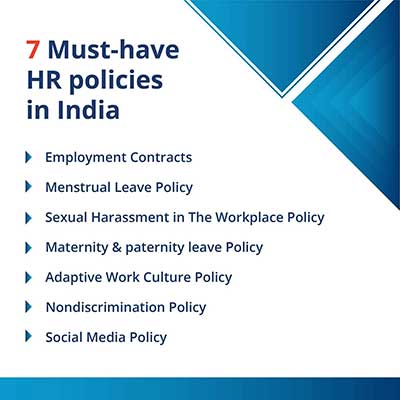HR Policies: 7 Must-Have HR Policies In India
Every organization aims to create a safe and progressive workplace. To achieve this, it needs to keep up with the evolving workplace trends around the world and make reforms to its own HR policies accordingly.
Organizations adhering to the age-old policies that do not comply with the modern circumstances such as unfavourable work culture, slow growth, and ultimately decline in human capital. Now that we’re familiar with the outcomes, let’s understand and learn more about HR policies – their purpose and the ones that should be a part of your policy handbook.
Purpose of HR policies
HR policy reforms created and amended for the welfare of the employees, enable organizations to establish boundaries and avoid conflicts while fostering a healthy workplace environment. They help organizations manage their human capital efficiently and achieve the desired growth. HR policies also help organizations meet the legal compliance requirements.
In some cases, good HR policies can give the organizations a competitive edge. Organizations with policies that facilitate healthcare, financial aid, employee welfare, etc. are highly sought after in the labour market and tend to have considerably low attrition rates.
An organization with comprehensive HR policies is able to meet training, diversity, regulation, and ethics requirements seamlessly.
How does an organization determine whether its HR policies are favourable for them and its employees? There are many options that an organization could go for, one of which includes hiring a street-smart staffing agency of their domain or looking at the policies below to see if they have included any of the must-have policies in India.
7 Must-have HR policies in India
1. Employment Contracts
Organizations in India are not entirely liable to engage contracts for local employees. However, creating a contract can help set the right expectations for the employees. It also covers all the agreements and NDAs that both organizations and employees have to observe and uphold.
The diversity and complex framework of the Indian judicial system and employment laws pertaining to it are difficult to navigate. Therefore, contracts enable organizations to prove their compliance and avoid legal prejudices.
Before drafting an employment contract, it is advisable to refer to some crucial laws that are established for the welfare of employees. Wage laws, Contract Act 1872, labour laws, and local laws are a few of them.
2. Menstrual Leave Policy
This policy has been adopted by top companies such as Swiggy, Zomato, Culture Machine, Byju’s and more. Women in these organizations get the option to avail paid or unpaid leaves if they are unable to report to work due to menstrual pain or sickness.
Though a small gesture, this creates a huge impact on women’s well-being in the workplace. Also, in 2017, Ninong Ering, a member of the parliament of Arunachal Pradesh introduced the Menstruation Benefits Bill 2017. The bill implies that women working in private and public sectors registered with the Central and/or State government are entitled to get two days of menstrual leave every month.
3. Sexual Harassment in The Workplace Policy
As a moral and legal obligation, organizations must take extra steps to make the workplace safer for women. The laws pertaining to women’s safety in the workplace have been amended by the Indian legislature.
The Sexual Harassment Act, 2013 has been very effective in the Indian business sectors. It protects the employees of a company and also the female customers or clients visiting it.
The Act emphasizes any organization with more than 10 employees must instate an Internal Complaints Committee. It also specifies the measures to be taken in such cases.

4. Maternity and Paternity leave Policy
According to the Maternity Benefits (amendment) act, 2017, organizations with more than 10 workers are liable to provide maternity benefits. The act specifies the benefits and number of leaves that pregnant women can avail after they have completed 80 days in an organization.
Paternity leaves have not yet become a part of our legislature. However, the government has upheld a Paternity Benefit Bill in 2017. As it roped in conversations around equality and humanity, the bill has been lauded across the country by citizens.
5. Adaptive Work Culture Policy
After the pandemic, the working sector has undergone many changes and also explored avenues that benefit both employers and employees. There has been a sharp rise in the number of employees looking for flexible work options such as working from home or a 5-day workweek.
Keeping this policy as a part of the organizational guidelines can be a smart move. Adaptive work culture not only ensures the safety of employees but can also be a strategic leeway for dealing with crises. Some organizations that have adopted a hybrid or 5-days workweek model have seen increased productivity among employees.
6. Nondiscrimination Policy
Many organizations have been known in the past as the breeding ground for discrimination. Prejudices on the basis of age, colour, sex, caste, creed, etc. have been reported in such companies.
Every Indian has the fundamental right to be treated equally. The constitution states in Articles 14, 15, and 16 that every person living in this country is equal and any kind of discrimination can result in legal consequences.
This policy ensures the workplace becomes a place of opportunity and growth. Organizations must also take extra measures to prevent discrimination and educate the employees about it.
7. Social Media Policy
Organizations have started adding a social media policy in their HR guidelines. This policy helps organizations keep their reputation safe online. Before including this policy, it is very important to outline the topics or information that employees are permitted to share on social media. The policy should also describe the actions that can be taken if any of the rules are violated.
Conclusion
An organization without robust HR policies can easily get meddled among petty or major HR issues. Effective, considerate, and detailed policies can help you address and resolve problems systematically.
It is the duty of the HR/ HR department to incorporate policies that are compliant with the regional and national laws. HR should be knowledgeable about the laws and implement procedures correctly.




